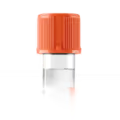Do I need an Albumin test?
Feeling unusually tired, noticing swelling in your legs or ankles, or concerned about unexplained weight changes? Could low albumin be affecting your body's ability to maintain fluid balance and transport vital nutrients?
Albumin is the most abundant protein in your blood, playing a crucial role in maintaining fluid balance, transporting hormones and nutrients, and supporting overall tissue health. Low levels can signal liver or kidney issues, malnutrition, or inflammation.
Testing your albumin gives you a vital snapshot of your liver function, nutritional status, and protein balance. It's a key first step to understanding what's behind your fatigue or swelling and personalizing your nutrition and lifestyle to restore balance.
Method: FDA-cleared clinical laboratory assay performed in CLIA-certified, CAP-accredited laboratories. Used to aid clinician-directed evaluation and monitoring. Not a stand-alone diagnosis.

A derived biomarker is a value that is calculated from other directly measured biomarkers rather than being measured directly in the lab.
Get tested with Superpower
If you’ve been postponing blood testing for years or feel frustrated by doctor appointments and limited lab panels, you are not alone. Standard healthcare is often reactive, focusing on testing only after symptoms appear or leaving patients in the dark.
Superpower flips that approach. We give you full insight into your body with over 100 biomarkers, personalized action plans, long-term tracking, and answers to your questions, so you can stay ahead of any health issues.
With physician-reviewed results, CLIA-certified labs, and the option for at-home blood draws, Superpower is designed for people who want clarity, convenience, and real accountability - all in one place.
Key benefits of Albumin testing
- Measures your liver's ability to produce essential protein for health.
- Spots early liver stress before symptoms like fatigue or swelling appear.
- Flags malnutrition or protein loss that weakens immunity and healing.
- Explains unexplained swelling in legs, ankles, or abdomen.
- Guides treatment for chronic kidney disease by tracking protein loss.
- Tracks recovery after surgery, infection, or critical illness.
- Best interpreted with liver enzymes, total protein, and your symptoms.
What is Albumin?
Albumin is the most abundant protein in your blood, made continuously by your liver and released into circulation. It's a small, sturdy molecule that accounts for roughly half of all the protein floating in your plasma.
Your blood's multitasking workhorse
Albumin serves as the body's master transporter and fluid regulator. It ferries hormones, vitamins, drugs, and fatty acids to tissues that need them. At the same time, it acts like a sponge, holding water inside your blood vessels through osmotic pressure. Without enough albumin, fluid leaks into tissues, causing swelling.
A window into liver and kidney health
Because albumin is produced only by the liver and filtered carefully by the kidneys, its blood level reflects how well both organs are functioning. It also responds to inflammation, nutrition, and chronic illness. Measuring albumin gives clinicians a snapshot of your body's protein balance and overall physiological resilience.
Why is Albumin important?
Albumin is the most abundant protein in your blood, manufactured exclusively by your liver and released into circulation to hold fluid inside your vessels, ferry hormones and nutrients to tissues, and buffer acids throughout your body. When albumin levels fall outside the typical range of roughly 3.5 to 5.5, it signals that your liver, kidneys, nutritional state, or inflammatory burden may be compromised. Optimal values usually sit in the mid-to-upper portion of the range, reflecting robust liver synthesis and minimal protein loss.
When albumin drops, fluid escapes
Low albumin means your blood cannot hold water effectively, so fluid leaks into tissues and body cavities, causing swelling in the legs, abdomen, or lungs. This happens with chronic liver disease, kidney damage that spills protein into urine, severe malnutrition, or prolonged inflammation from infection or autoimmune conditions. Fatigue, poor wound healing, and susceptibility to infection often follow because albumin also transports immune molecules and micronutrients.
High albumin usually reflects dehydration
Elevated albumin is rarely a primary disease but instead points to concentrated blood from dehydration or severe fluid loss. It can also appear transiently during acute stress or hemoconcentration.
The big picture
Albumin integrates liver function, kidney integrity, nutritional reserves, and systemic inflammation into a single number. Persistent abnormalities predict higher risks for hospitalization, slower recovery from illness, and poorer long-term outcomes across cardiovascular, metabolic, and immune health.
What do my Albumin results mean?
Low albumin usually reflects reduced production or increased loss
Low values usually reflect either inadequate synthesis by the liver or excessive loss through the kidneys or gut. Chronic liver disease, malnutrition, and inflammatory states all suppress albumin production. Protein-losing conditions such as nephrotic syndrome or protein-losing enteropathy drain albumin from circulation. Low albumin reduces oncotic pressure, which can lead to fluid shifts into tissues and contribute to edema or ascites. It also impairs nutrient transport and drug binding, affecting how medications behave in the body.
Optimal albumin suggests healthy liver function and protein balance
Being in range suggests that your liver is synthesizing protein efficiently and that you are not losing excessive albumin through kidneys or intestines. Optimal values typically sit in the mid to upper portion of the reference range and reflect stable hydration, adequate protein intake, and low systemic inflammation. This supports normal fluid distribution, nutrient transport, and overall metabolic resilience.
High albumin usually reflects dehydration
High values usually reflect dehydration or hemoconcentration rather than true overproduction. When plasma volume contracts, albumin concentration rises. This is common with inadequate fluid intake, vomiting, diarrhea, or diuretic use.
Context matters for accurate interpretation
Albumin declines naturally with age and during acute illness or surgery due to inflammation. Pregnancy lowers albumin through hemodilution. Results should always be interpreted alongside hydration status, liver function, kidney health, and inflammatory markers.

.svg)









.avif)
.avif)


